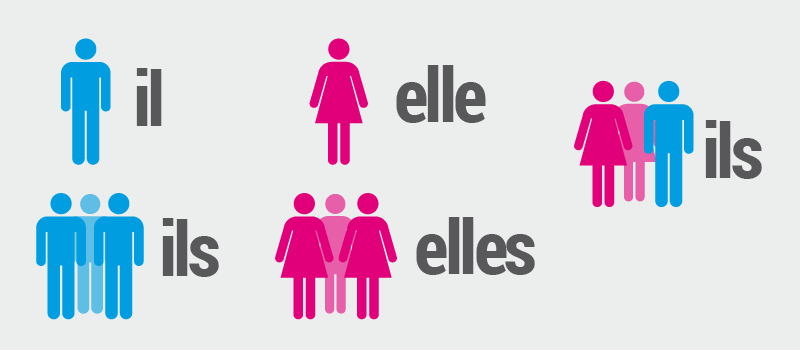Subject and Object Pronouns in French
Today we are learning the “subject” and “object” pronouns in French. If you are not familiar with these words, don’t panic!
They refer to:
- the subject: who does the action?
- the object: to who?
We will focus first on the subject pronouns and then on the object pronouns. Where audio files are available, we advise you to practice the pronunciation by repeating a minimum of 3 times, for your brain to assimilate the structure.
1. Subject pronouns.
In French, much like in English, subject pronouns are short words that allow us to say who does the action. They are particularly useful when we don't want to repeat the name of a person:
- "James came to the party last night. James brought some wine."
It is a lot more idiomatic to replace the second James by "He".
- "James came to the party last night. He brought some wine."
Naturally, it is even more useful with "we", "they" and the plural "you". We don't want to repeat the whole list of people!
Here are the subject pronouns, with their English translation:
|
Je |
I |
|
Tu |
You |
|
Il |
He |
|
Elle |
She |
|
Nous |
We |
|
Vous |
You (plural) |
|
Ils group of men only OR both men and women |
They |
|
Elles group of women only |
They |
Please note three things:
1. The French do NOT pronounce the "s" at the end of words. EVER. So "il/elle" and "ils/elles" have the same pronunciation. The context is always self-explanatory.
2. Though "the masculine gender always wins" in grammatical and vocabulary conflicts in French*, the language does provide a female-only pronoun when it comes to groups of people.
|
If there are only men at your party
|
If there are both men and women at your party |
If there are only women at your party |
|
ILS
|
ILS |
ELLES |
|
"Ils sont cool."
|
"Ils sont cool." |
"Elles sont cool." |
* Unfortunately, this is not a gender-equal system: if there are 100 women and 1 man at your party, grammatically you should still use "ils".

3. The "I" pronoun "je" becomes "j' " in front of words that start with a vowel OR the letter "h".
"Je suis américain."
BUT
"J'arrive à 16h31. J'habite à Paris."
In French, the vowels are A, E, I, O, U and Y.
2. Object pronouns.
Object pronouns are the short words you use to avoid a repetition of the name of the person: who does the subject do the action to?
"James me téléphone." "James calls me."
As you can see, French object pronouns go BEFORE the verb.
It is very important to know that in French there are DIRECT pronouns and INDIRECT pronouns, and they have different forms. To make this easy on yourself, look if the French verb is introduced by the preposition "à". If it is "à Laura", you know it's indirect. If there isn't anything, it's direct. Check these out:
2.1 DIRECT object pronouns:
- I see James. I see him.
Je vois James. Je le vois. - I watch TV. I watch it every day.
Je regarde la télé. Je la regarde tous les jours. - I call you guys tomorrow.
Je vous appelle demain.
|
SINGULAR |
me you him her
it |
me te le la
le OR la depending on the gender of the thing/object. |
|
PLURAL |
us you them |
nous vous les |
2.2 INDIRECT object pronouns
Can you see the "à"?
- I give the book to the teacher. I give her the book ("to her").
Je donne le livre à la prof. Je lui donne le livre. - I write to Suzanne. I write her ("to her").
J'écris à Suzanne. Je lui écris. - I ask Thomas. I ask him ("to him").
Je demande à Thomas. Je lui demande.
|
SINGULAR |
me you him her it |
me te lui lui lui |
|
PLURAL |
us you them |
nous vous leur |
Note that in both cases, the English use the same set of pronouns!
Also note that the vowel rule applies here too. Use the apostrophe " ' ".
Je te demande.
BUT
Je t'appelle.
That's it for today, well done!
Put it into practice!
As soon as you start expressing yourself in French, you'll need those! You can practice here:
- I see the chairs in the garden. (them) - I send the document tonight. (it)
- I know the lesson. (it) - You tell us the good news. (us)
- I speak to James. (him) - She listens to the song on the bus. (it)
In the next level, we will learn how to combine these pronouns!
Thanks for visiting!
Some other stuff here
This Course
Basic French

Just getting started? Here are all the basics, from introducing yourself, to numbers, the alphabet and loads more crazy Gallic stuff.
Other sections in this course
Real French I

Forget the textbooks. Here's the sort of informal French you'll hear amongst friends.
It's the type of really practical language that you'll use all the time in casual conversations, but nobody's actually ever bothered to teach you. Until now.
1.2: Show me more!

You've learnt the basics (Tell me you've learnt the basics!) and want to move on? Let's look at likes and loves and a whole load of other stuff.
Basic French Grammar

Your starter's guide to French grammar rules.
1.1 Know nothing? Start here!

Bienvenue to our series of classes for anyone starting to learn French, or those of you who were smoking behind the bike sheds when they should have been in French class.
Our focus in these classes is on real, practical examples which you can start to use straight away. We'll keep grammar to a minimum, promise!
Basic French Grammar
Other classes in this section:
Subject Pronouns

Let's start at the beginning with one of the easiest parts of French grammar. As you'll soon see, there's nothing too complicated about subject pronouns in French.
Object pronouns

What are object pronouns, and how do we use them in French?
An introduction to French Verbs

In this basic grammar class we're going to take a look at the main types of French verbs.
Irregular French verbs

How do we conjugate irregular French verbs? As we'll see, some of the most common - and most useful - French verbs are irregular. In this class we'll look at some really essential irregular verbs and show you how to conjugate them in the present tense.
Subject and Object Pronouns in French

An introduction to subject pronouns and object pronouns.
